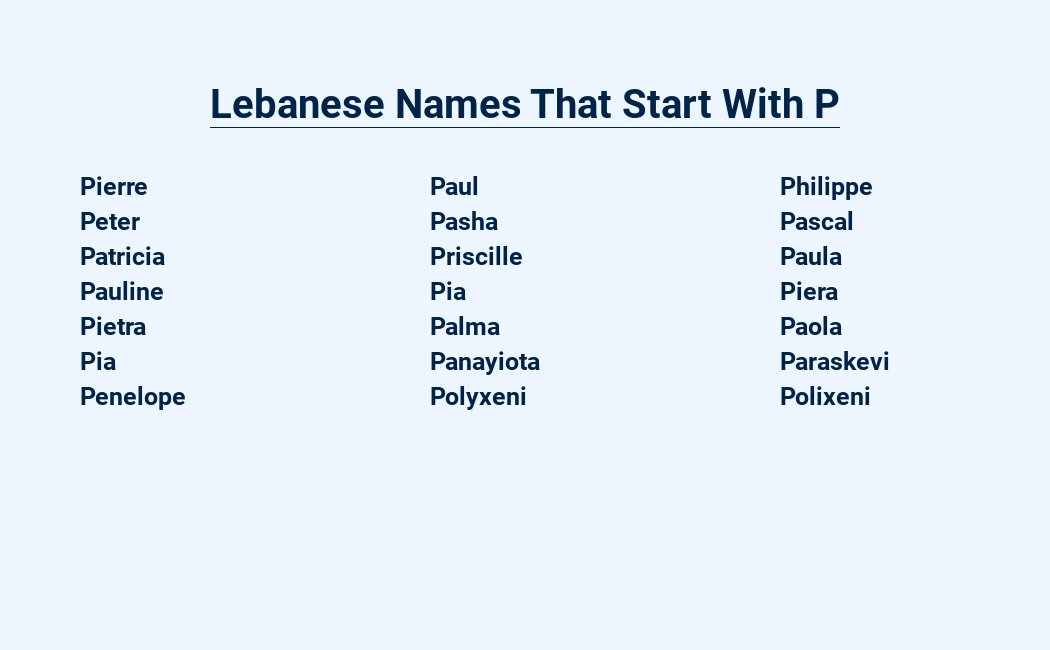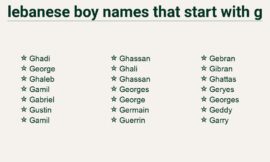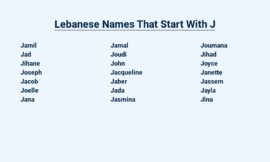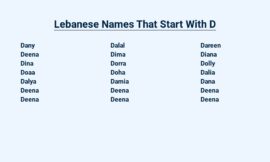Embark on a journey into the rich tapestry of Lebanese names that begin with the letter P.
Discover a treasure trove of beautiful and unique names, each carrying a special meaning and a captivating history.
From traditional to modern, these names reflect the diverse cultural heritage of Lebanon.
Let’s delve into the world of Lebanese names starting with P and uncover their hidden gems.
| Name | Meaning | Gender |
| Patricia | Noblewoman, Patrician | Female |
| Paul | Small, Humble | Male |
| Peter | Rock | Male |
| Philip | Lover of Horses | Male |
| Priscilla | Ancient | Female |
Lebanese names that start with p
Paul (male): Meaning “small” or “humble”, Paul is a popular name of Latin origin in Lebanon. It is often associated with the apostle Paul, who played a significant role in spreading Christianity.
Peter (male): Derived from the Greek word “petros” meaning “stone” or “rock”, Peter is another common name in Lebanon. It is associated with the apostle Peter, who was a close companion of Jesus Christ.
Philip (male): Originating from the Greek word “philippos”, meaning “lover of horses”, Philip is a name that conveys strength and nobility. It is also associated with the apostle Philip, who was one of the twelve disciples of Jesus.
Pierre (male): The French form of Peter, Pierre is used in Lebanon as an equivalent to the English name Peter. It holds the same meaning and associations with the apostle Peter.
Paula (female): The feminine form of Paul, Paula is a name that exudes humility and modesty. It is associated with several notable female figures in Christianity, including Saint Paula of Rome.
Patricia (female): Meaning “noblewoman” or “patrician”, Patricia is a name of Latin origin that denotes high social status and refinement. It is often used in Lebanon to convey a sense of elegance and sophistication.
Pascale (female): Derived from the French word “paschal”, meaning “relating to Easter”, Pascale is a name that evokes the joy and renewal associated with the Easter season. It is a popular choice for girls born around Easter or during the spring season.
Priscilla (female): Originating from the Latin word “priscus”, meaning “ancient” or “venerable”, Priscilla is a name that conveys a sense of respect and tradition. It is associated with several notable women in the Bible, including the wife of Aquila.
Pamela (female): A name of Greek origin, Pamela is composed of the elements “pan” (all) and “melos” (song). It is often interpreted as “all-melodious” or “sweet-voiced”. Pamela is known for its association with the character in the famous novel “Pamela, or Virtue Rewarded” by Samuel Richardson.
Phoebe (female): Derived from the Greek word “phoibos”, meaning “bright” or “radiant”, Phoebe is a name that evokes a sense of light and joy. It is also associated with the Greek goddess Phoebe, who was the personification of the moon.
Lebanese Names That Start with P
Male Names
Lebanese male names starting with “P” are abundant and reflect the country’s rich cultural heritage.
Prominent examples include Pierre, a French-influenced name meaning “rock,” and Pasha, a title of high rank and authority.
Other popular choices are Paul, denoting “small” or “humble,” and Philip, derived from the Greek word for “lover of horses.”
Female Names
Lebanese female names starting with the letter “P” encompass a rich heritage and diverse meanings.
From the classic and timeless “Pamela,” symbolizing honey, to the elegant and sophisticated “Paloma,” representing peace, these names hold a special place in Lebanese culture.
Final Verdict
Lebanese names that begin with the letter “P” possess a unique blend of charm and historical significance. From the masculine strength of Patrick to the feminine grace of Patricia, these names reflect the rich cultural heritage of Lebanon.
The popularity of these names extends beyond Lebanon, capturing the hearts of people worldwide.
As the world continues to embrace diversity, Lebanese names like Paul, Philip, and Pamela continue to inspire and captivate.




